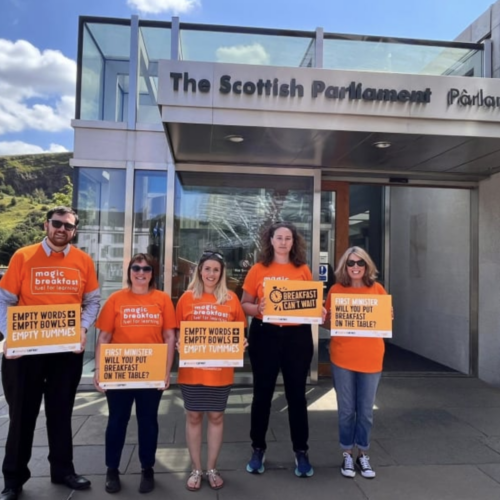The most recent inflation figures make for grim reading for those of us concerned about food insecurity, with high overall inflation made worse by soaring food prices.
Let’s start at the beginning – what is inflation? Inflation, simply put, is a rise in prices for goods and services. When inflation goes up, the purchasing power (how much it can buy) of money goes down – in other words, you need more money to buy the same stuff.
You might have felt this yourself – anyone who’s visited a supermarket in the past year will no doubt have noticed that money doesn’t seem to go as far as it used to. Prices are rising. The Guardian has recently reported price jumps of 80% for key staples. Beyond individual products, you might have noticed that the overall cost of your weekly shop has gone up.
Inflation is measured for various goods and services across the population, and they’re all lumped in to what’s called ‘CPIH’ inflation – this stands for Consumer Price Index, plus Housing. The Government has pledged to bring down inflation, and it is indeed slightly down from its high point in October 2022. It sits at 8.9% currently, and will, according to many estimates, generally trend downwards for most of 2023, reaching 2.9%.i
In the meantime, however, the rate of inflation for food has continued to grow. It now sits at 19.2%, more than double the rate of CPIH inflation, after a decade where inflation was low, and food’s inflation level was almost always below the overall inflation rate. We aren’t used to this. It hasn’t been this high since 1977 – for context, Fleetwood Mac had just released Rumours, Elvis was at number one, and audiences were settling into their cinema seats to watch the latest smash hit film: the very first Star Wars movie.
When food continues to rise in price, everyone feels it. But those with less money, understandably, feel it far more. There’s a good reason for this: poorer families have to spend more of their money on the essentials: housing, food, and heating. The poorest quintile of UK households would have to spend 40% of their disposable income on food to meet the Governments Eatwell Guide, compared to just 7% for the richest quintile of households.
Too often, ‘switching brands to something cheaper’ is painted as a solution to the cost of living crisis. But this can only be done once, and furthermore, often ‘saver’ products have experienced sharper jumps. Which? Magazine’s price tracker shows the ‘own label budget’ categories are experiencing the highest rises of all.
It’s also really important to consider a crucial – and sometimes misunderstood – point. Inflation is measuring price rise over time. When inflation drops to ‘normal’ levels (2% is the Bank of England target, so let’s take that as an example), that doesn’t mean prices will fall. Their rise will simply be slowed. Without growth of wages and the social safety net, the current inflation crisis could force many more families into food insecurity, and ‘normal’ food prices may not be coming back.
This isn’t a ‘fun fact’ to be dispassionately noted, or a mere quirk of economic analysis. At the end of these figures are real people who are facing very real consequences. We’ve heard recently from families – especially larger families (defined as families with more than two children) – that in some cases, parents are going without food to ensure that children can eat, and the Joseph Rowntree Foundation are reporting that for those in the bottom 20% of incomes, three quarters are going without essentials.
This is the context in which we are now operating, trying to make sure that despite the challenging environment for the country’s poorest children and young people, their needs are met and they can reach their full potential in the classroom. This is also why Magic Breakfast works to advocate for national—and local—governments to support young people and invest in breakfast. This is a profound problem, and needs Government attention.






